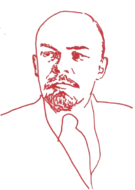Democratic centralism: Difference between revisions
import>CyberSynGang m (1 revision imported: Imported from Marxistpedia) |
RedParabola (talk | contribs) mNo edit summary |
||
| (3 intermediate revisions by 2 users not shown) | |||
| Line 1: | Line 1: | ||
{{Leninism sidebar}} | |||
'''Democratic centralism''' is a [[Leninism|Leninist]] democratic practice in which political decisions reached by voting processes are binding upon all members of the party. | '''Democratic centralism''' is a [[Leninism|Leninist]] democratic practice in which political decisions reached by voting processes are binding upon all members of the party. | ||
== In practice == | == In practice == | ||
In party meetings, a motion (new policy or amendment, goal, plan or any other kind of political question) is proposed. After a period of debate, a vote is taken. If one vote clearly wins (gaining 60% or above share if two options for example) all participants (the party) are expected to follow that decision, and not continue propagandising or otherwise working against it, aiming to act in unity. If participants still disagree, instead of splitting and forming another party as in [[Representative Democracy]] they are expected to table a motion for discussing the issue again. In the development of [[socialism]] in the Soviet Union and China, it was largely taken up in response to dramatic developments and violence which required faster mechanisms of making decisions. A constellation of practices surround this in order to encourage participation and debate, such as Don't Blame the Speaker. <ref name=criticism>{{cite web|author=Mao Tse Tung|year=1944|url=https://www.marxists.org/reference/archive/mao/works/red-book/ch15.htm|title=Mao Tse Tung Quotations from Mao Tse Tung 15. Democracy in the Three Main Fields |accessdate=9 August 2002}}</ref> | In party meetings, a motion (new policy or amendment, goal, plan or any other kind of political question) is proposed. After a period of debate, a vote is taken. If one vote clearly wins (gaining 60% or above share if two options for example) all participants (the party) are expected to follow that decision, and not continue propagandising or otherwise working against it, aiming to act in unity. If participants still disagree, instead of splitting and forming another party as in [[Representative Democracy]] they are expected to table a motion for discussing the issue again. In the development of [[socialism]] in the Soviet Union and China, it was largely taken up in response to dramatic developments and violence which required faster mechanisms of making decisions. A constellation of practices surround this in order to encourage participation and debate, such as Don't Blame the Speaker.<ref name=criticism>{{cite web|author=Mao Tse Tung|year=1944|url=https://www.marxists.org/reference/archive/mao/works/red-book/ch15.htm|title=Mao Tse Tung Quotations from Mao Tse Tung 15. Democracy in the Three Main Fields |accessdate=9 August 2002}}</ref> | ||
[[Category: | ==References== | ||
{{Reflist}} | |||
[[Category:Praxis]] | |||
[[Category:Theory]] | |||
[[Category:Leninism]] | |||
Latest revision as of 03:39, 22 March 2024
Democratic centralism is a Leninist democratic practice in which political decisions reached by voting processes are binding upon all members of the party.
In practice
In party meetings, a motion (new policy or amendment, goal, plan or any other kind of political question) is proposed. After a period of debate, a vote is taken. If one vote clearly wins (gaining 60% or above share if two options for example) all participants (the party) are expected to follow that decision, and not continue propagandising or otherwise working against it, aiming to act in unity. If participants still disagree, instead of splitting and forming another party as in Representative Democracy they are expected to table a motion for discussing the issue again. In the development of socialism in the Soviet Union and China, it was largely taken up in response to dramatic developments and violence which required faster mechanisms of making decisions. A constellation of practices surround this in order to encourage participation and debate, such as Don't Blame the Speaker.[1]
References
- ↑ Mao Tse Tung (1944). "Mao Tse Tung Quotations from Mao Tse Tung 15. Democracy in the Three Main Fields". Retrieved 9 August 2002.
